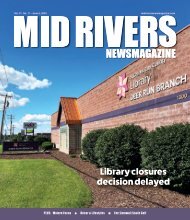West Newsmagazine 9-26-18
Local news, local politics and community events for West St. Louis County Missouri.
Local news, local politics and community events for West St. Louis County Missouri.
You also want an ePaper? Increase the reach of your titles
YUMPU automatically turns print PDFs into web optimized ePapers that Google loves.
42 I COVER STORY I<br />
September <strong>26</strong>, 20<strong>18</strong><br />
WEST NEWSMAGAZINE<br />
@WESTNEWSMAG<br />
WESTNEWSMAGAZINE.COM<br />
Recycling Redux:<br />
How changes in imports will impact local services<br />
By JESSICA MESZAROS<br />
The cost of recycling may soon mean<br />
more than just a trip down the driveway.<br />
Following a change in China’s legislation<br />
regarding its U.S. recycling imports,<br />
the recycling industry across the U.S. has<br />
taken a hit and been forced to re-evaluate<br />
its services. At the heart of the issue is<br />
ongoing over-contamination, which raises<br />
the cost of recycling efforts in the U.S.<br />
market. In short, China only wants to<br />
import clean recycling and single-stream<br />
services – everything in one bin, picked<br />
up at the curb – which results in recycled<br />
materials that could be classed as “dirty.”<br />
For decades leading up to recent<br />
changes, China served as the largest consumer<br />
of recyclable materials generated in<br />
the United States. Five years ago, China<br />
fronted the “Green Fence” initiative to<br />
crack down on contaminated recyclables<br />
coming into the country. In January 20<strong>18</strong>,<br />
China continued its crackdown on contaminated<br />
recyclables and passed its “National<br />
Sword” policy. The action effectively bans<br />
24 types of solid waste, including various<br />
plastics and unsorted mixed papers, in<br />
addition to raising contamination standards<br />
again. Under its “Red Sword” policy,<br />
China is rejecting shipments with contaminants<br />
above 0.5 percent, a level that most<br />
U.S. recyclers have difficulty meeting with<br />
current methods.<br />
In May 20<strong>18</strong>, China suspended all imports<br />
of U.S. recycled materials until June,<br />
regardless of the quality. Due to increasing<br />
costs and the decreasing value of materials,<br />
the switch created a stockpile of recyclables<br />
and a lack of available buyers.<br />
The impact has area municipalities and<br />
the waste haulers that serve them debating<br />
the future of single-stream, curbside recycling,<br />
which makes up over 90 percent of<br />
the region’s waste management market.<br />
“China and the world markets have not<br />
been silent regarding their concern of contamination<br />
being collected curbside and<br />
shipped by the U.S. recycling processors,”<br />
said Mary O’Brien, Meridian Waste Services’<br />
chief marketing officer. “This has<br />
been an issue brewing for many years, and<br />
just this year, the issue reached the height of<br />
its impact with China’s Green Fence policy<br />
followed by its Red Sword policy.”<br />
“The policies were an effort on China’s<br />
part to reduce the amount of contamination<br />
coming into their country,” Brent Batliner,<br />
general manager for Republic Services, said.<br />
“They went from standards where the material<br />
you shipped in could have<br />
2 percent contamination in it<br />
and dropped those standards to<br />
around half a percent, which is<br />
almost impossible to meet.<br />
“If we got everything in<br />
perfect, and if the public did<br />
everything we wanted, we would still have<br />
about 3- or 4-percent contamination, just<br />
by things breaking or ripping in the truck,”<br />
Batliner said. “Small pieces of paper or<br />
plastic that break become grit in the system,<br />
kind of like dirt.”<br />
According to O’Brien, China’s crackdown<br />
is due to widespread ignorance about<br />
proper recycling.<br />
“Contamination in the recycling stream<br />
is the No. 1 reason the U.S. is in the predicament<br />
we are in,” O’Brien said.<br />
But getting consumers on board with<br />
change won’t be easy and may mean the<br />
end of single-stream recycling.<br />
According to the National Waste &<br />
Recycling Association, contamination<br />
rates via the collection and processing of<br />
residential single-stream recycling start at<br />
about 25 percent, thus making the contamination<br />
levels unacceptable for collection.<br />
Resource Management Companies<br />
[RMC], which owns and operates material<br />
recovery facilities across the country and<br />
serves locally as the collection facility for<br />
a large number of waste haulers, has said it<br />
will not accept single-stream recycling collections<br />
after Nov. 1.<br />
That change has forced municipalities to<br />
reconsider recycling options for residents<br />
moving forward.<br />
The end of single-stream?<br />
“It’s not hitting us yet, but we do anticipate<br />
that it is going to hit us because it is essentially<br />
a nationwide issue that is being dealt<br />
with by the entire country,” Rick Brown,<br />
Wildwood’s city engineer and director of<br />
public works, said. Wildwood residents are<br />
served by Meridian Waste Services.<br />
Other municipalities are seeing a more<br />
immediate effect.<br />
In August, Kirkwood announced the<br />
suspension of its residential curbside<br />
recycling collection. The single-stream<br />
program, which allows plastic, cardboard,<br />
paper and aluminum to be recycled in one<br />
container, will come to an end in October.<br />
Kirkwood’s recycling processor is RMC.<br />
Batliner, of Republic Services, said, “The<br />
demand is still there, it’s just the logistics<br />
of handling it, which has backed material<br />
up globally. It has drastically driven the<br />
value of the material down.”<br />
Republic Services is currently working<br />
on increasing personnel along sorting lines<br />
and in other areas to continue to provide<br />
recycling services to customers in municipalities<br />
like Ballwin, Chesterfield, Ellisville<br />
and Manchester, to name a few.<br />
“We are going to have to invest more<br />
money in equipment to make a cleaner<br />
product to sell worldwide, and we are<br />
making that investment,” Batliner said.<br />
“We have had to add a few more people to<br />
assure, with the quality control at the end<br />
of our line, that everything is coming up<br />
to the specification we need. Long term,<br />
the processing cost will probably increase,<br />
but once again, what offsets it is the value<br />
of the material. That’s really the problem<br />
right now ... but that will recover.”<br />
Waste Management saw a 36-percent<br />
decrease in average recycling commodity<br />
prices in the first quarter of 20<strong>18</strong> and<br />
saw an increase in operations costs. The<br />
increase is credited to the transportation of<br />
materials to areas like Vietnam and India,<br />
whose criteria is not as strict as China’s.<br />
“If I’m not shipping thousands of tons a<br />
month to China, now I have to find a new<br />
home for it. That doesn’t happen overnight,”<br />
Batliner said.<br />
And it doesn’t come cheaply.<br />
“Recycling is not free,” O’Brien said.<br />
“It takes money to buy trucks, hire commercial<br />
driver’s license [CDL] drivers,<br />
invest in heavy equipment and processing<br />
machinery, ship baled recyclables to end<br />
markets and so forth. Understanding the<br />
costs of recycling is step one. Then, when<br />
markets are good, sharing the benefits of a<br />
rebate is step two.”<br />
Due to the steady export of contaminated<br />
materials, the stability of the<br />
market for recyclables has resulted in<br />
processors having to pay more money to<br />
get rid of materials, rather than reselling<br />
cleaned materials with reusable capabilities<br />
for a profit.<br />
“It’s very attractive to recycle when markets<br />
are good, as they were five years ago<br />
and even earlier in the 2000s,” O’Brien said.<br />
“However, when markets shift and what<br />
used to be a refund becomes an expense, the<br />
financial impact is harsh and very real.”<br />
[Shutterstock image]<br />
According to O’Brien, Meridian’s current<br />
recycling processing fee of $37.45 per<br />
ton is significantly higher than the company’s<br />
internal rate of transportation and<br />
disposal at locations across the country,<br />
including the Eagle Ridge Landfill in St.<br />
Louis, equating to about a 25-percent differential<br />
between the current cost of recycling<br />
processing and local landfilling in the<br />
St. Louis marketplace.<br />
Due to facilities like RMC no longer collecting<br />
residential single-stream recycled<br />
materials after November 20<strong>18</strong>, the $37.45<br />
per ton rate is expected to increase even<br />
more over time. According to O’Brien,<br />
municipal waste contracts are typically<br />
long-term, fixed-rate contracts.<br />
“Recycling is a commodity-driven business<br />
– individual materials have a value<br />
based upon market conditions,” O’Brien<br />
said. “Single stream, mixed materials have<br />
a value as well. It truly is a classic economics<br />
example of supply and demand.”<br />
The rising cost of ‘wish-cycling’<br />
The trend of “wish-cycling” is one of the<br />
factors complicating the process.<br />
Wish-cycling happens when uncertain<br />
consumers choose the recycling bin for<br />
an item that should go to the trash. Nonrecyclable<br />
items like coolers, diapers, food<br />
waste and plastic shopping bags get tangled<br />
up in the system due to ignorance or<br />
wish-cycling, creating additional demands,<br />
delays and often repairs to the system.<br />
According to O’Brien, some of the most<br />
common wish-cycling items are plastic<br />
toys, aerosol cans, pizza boxes and clothes.<br />
Waste from non-recyclable materials can<br />
contaminate other collected materials,<br />
thereby impacting the ability of all the<br />
goods to be recycled.<br />
“If someone throws a whole jar of peanut<br />
butter in [the recycling bin], and that jar<br />
gets smashed, a pound of peanut butter<br />
squirts out into all the other materials in<br />
that truck,” Batliner said. “A lot of that<br />
material then has to be trashed with it.”<br />
Even small amounts of such viscous materials<br />
are problematic.<br />
Landfilling, by contrast, is easier and<br />
cheaper, but with no value added.<br />
“Maybe to have [trash] picked up from

















